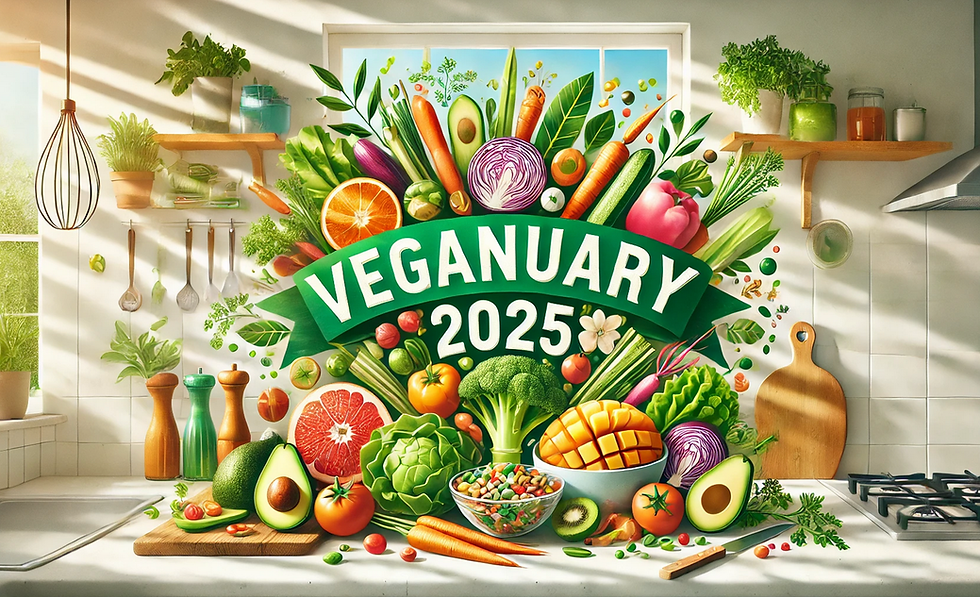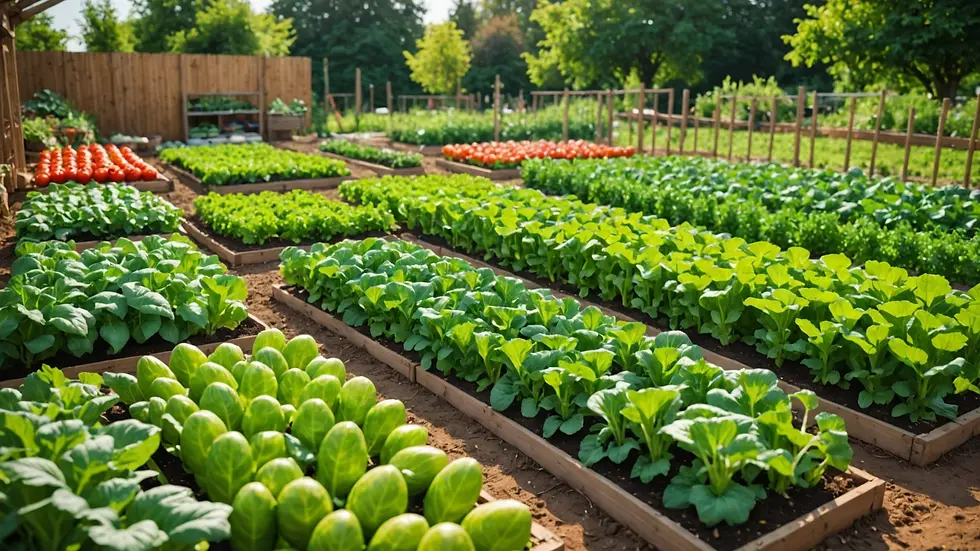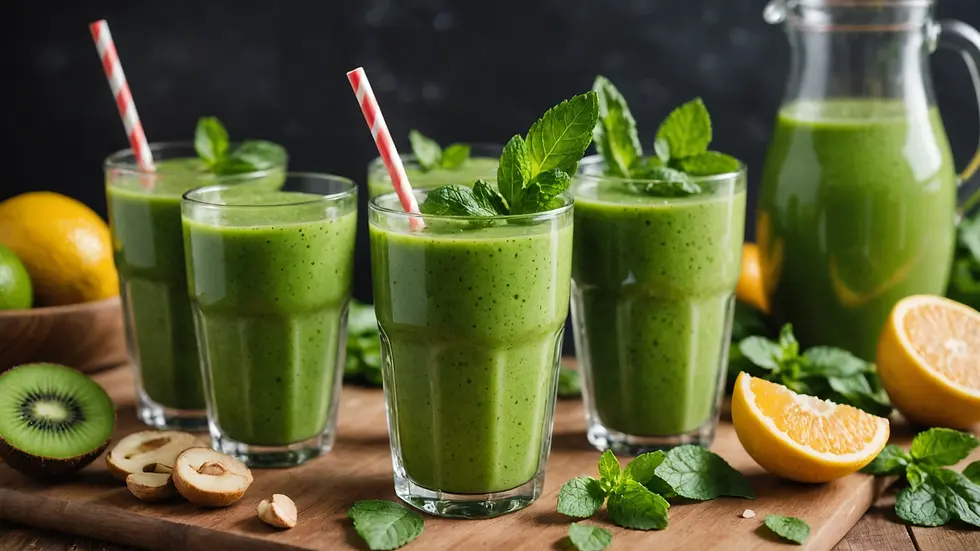Discover the Unexpected Benefits of Veganuary and How to Embrace a Vegan Lifestyle Today!
- Cynthia

- Dec 27, 2024
- 8 min read
Updated: Dec 28, 2024
Every January, millions of people around the globe take part in something called "Veganuary." This initiative encourages participants to adopt a vegan diet for the entire month, allowing them to explore the delicious possibilities of plant-based eating. But the advantages of embracing veganism go beyond mere curiosity; they touch on our health, animal welfare, and the future of our planet.
Let’s explore why Veganuary deserves your attention, the significant benefits of a vegan lifestyle, and practical tips for making the transition.

The Health Benefits of Veganism
Switching to a vegan diet can lead to substantial health improvements. For instance, research from the American Journal of Clinical Nutrition reveals that vegans have a 32% lower risk of heart disease compared to meat-eaters. A plant-based diet is typically high in fruits, vegetables, legumes, nuts, and seeds, all of which provide essential nutrients and antioxidants. According to the Doctors For Nutrition "a well-implemented whole food plant-based diet has the ability to prevent and even reverse some chronic diseases."
By eliminating animal products, many people experience a decrease in saturated fat and cholesterol. One study found that participants who followed a vegan diet saw reductions in total cholesterol levels by an impressive 12-20% within just a few weeks.
Additionally, many individuals report feeling more energetic and alert. Foods rich in fiber, such as beans and whole grains, can contribute to improved digestion and sustained energy levels throughout the day.
Animal Welfare
Adopting a vegan lifestyle has a profound impact on animal welfare. By favoring plant-based options, individuals reduce the demand for factory-farmed meat, where animals often face stressful and cramped conditions. Statistically, around 99% of farmed animals in the U.S. are raised in factory farms, where they typically do not experience natural behaviors.

Just Dairy and Eggs?
Choosing to restrict one's animal protein consumption to just dairy and eggs carries significant ethical, environmental, and health concerns. From an environmental perspective, dairy farming is a major contributor to greenhouse gas emissions, water pollution, and deforestation due to the need for large-scale feed production. Similarly, egg production, particularly in factory farms, often involves unsustainable practices that deplete resources and harm ecosystems. From an ethical standpoint, the dairy and egg industries subject animals to immense suffering, including confinement, forced breeding, and inhumane culling practices. Health-wise, diets high in dairy have been linked to increased risks of hormonal imbalances, certain cancers, and heart disease, while eggs are a source of cholesterol that may contribute to cardiovascular issues. Choosing plant-based alternatives not only alleviates these impacts but also supports a more sustainable and compassionate lifestyle.
But, What About Seafood?
While fish is often marketed as a healthy and sustainable protein source, there are growing concerns about its impact on health and the environment. Overfishing has depleted marine ecosystems, threatening biodiversity and disrupting oceanic food chains. Additionally, many fish now contain alarming levels of mercury, microplastics, and other pollutants due to water contamination, posing health risks to humans. Fish farming, originally seen as a solution, brings its own issues, such as water pollution, antibiotic overuse, and the spread of diseases to wild populations. By reducing or eliminating fish from your diet, you contribute to ocean conservation and safeguard your health from these hidden dangers.
Choosing veganism is not just a diet change; it's a compassionate choice that aligns with the values of kindness and empathy toward all living beings. By reducing our consumption of animal products, we assert that every sentient creature deserves a life free from suffering and exploitation.
Environmental Impact
Veganism plays a vital role in addressing environmental challenges. Research from Oxford University highlights that if the global population shifted to a plant-based diet, we could reduce food-related greenhouse gas emissions by a staggering 70% by 2050.
Animal agriculture contributes significantly to greenhouse gas emissions, deforestation, and water pollution. For instance, producing just one pound of beef requires approximately 1,800 gallons of water. By scaling back on animal products, individuals can drastically lower their carbon footprint and help preserve ecosystems.

How to Transition to a Vegan Lifestyle
Making the switch to a vegan diet can be straightforward and doesn't need to be a huge disruptive All-Or-Nothing change!
Here are some practical steps to help you along the way:
Start Slow: If going fully vegan feels overwhelming, begin with small changes. Try "Meatless Mondays" to start. Gradually increase your plant-based meals as you grow more comfortable with the options available.
Educate Yourself: Understanding vegan nutrition is crucial. Learn about key nutrients like protein, vitamin D, B12, and iron to ensure your diet remains balanced. Numerous resources, including books and reputable websites, can help you navigate this new way of eating.
Experiment with Recipes: Embrace the creative side of cooking! Explore websites or cookbooks filled with vibrant vegan recipes. Trying new dishes keeps your meals exciting and enjoyable.

The Plant-Based course offerings from Rouxbe.com This is where I started my journey. Find Support: Connecting with others can enhance your journey. Seek communities on social media or local groups focused on veganism. Sharing experiences and tips can provide inspiration and camaraderie.
Listen to Your Body: Monitor how your body feels as you shift to a vegan diet. It’s important to ensure you are thriving and meeting your nutritional needs. Consulting with a nutritionist can offer tailored advice as you adapt.
Seek out vegan/plant-based cooking classes: This is what I did when I went plant-based and I credit it with helping me make the change with very little drama. One can find all levels of plant-based cooking courses and videos, beginner to professional now, including: The Forks Over Knives Culinary Course, Rouxbe.com, T. Colin Campbell Center for Nutrition Studies, Escoffier School of Culinary Arts, The beauty of these courses is that you can do them on your schedule, fitting them into a busy life.
Taking it Further: The Benefits of a Sustainable Vegan Lifestyle
As you delve deeper into veganism, consider furthering your commitment to sustainability. Small changes can have a significant impact. Opt for eco-friendly products, limit waste, and support local sustainable farms. By aligning your lifestyle choices with your values, you contribute to a healthier planet.
A whole-food, plant-based (WFPB) way of eating can save money in many cases, though the savings depend on factors such as how you shop, cook, and the availability of affordable plant-based foods in your area. Here’s a breakdown:
Less Expensive Protein Sources:
Legumes (beans, lentils, chickpeas), whole grains (rice, quinoa, oats), and tofu are generally cheaper per pound than meat, poultry, or fish.
These foods also have a long shelf life, reducing waste.
Reduced Healthcare Costs:
A WFPB diet is associated with a lower risk of chronic diseases like heart disease, diabetes, and certain cancers, potentially reducing medical expenses.
Seasonal and Bulk Buying:
Fruits and vegetables, when bought in season or frozen, are affordable. Bulk buying of staples like grains and legumes can lead to significant savings.
Elimination of Processed Foods:
Minimizing or avoiding processed snacks, sugary beverages, and convenience foods cuts costs. You simply get more 'bang for your buck' from whole plant-based foods than processed foods.
Homemade Meals:
Preparing meals at home instead of eating out or buying prepackaged vegan options is generally much cheaper.

The Changing Retail Marketplace: More Vegan Options Than Ever
The retail marketplace has transformed significantly to meet the growing demand for vegan alternatives. Grocery store shelves now feature a wide array of plant-based products, including dairy-free milks, cheeses, and yogurts made from almonds, oats, soy, and cashews. Vegan meat substitutes like burgers, sausages, and nuggets have become mainstream, with brands like Beyond Meat and Impossible Foods leading the way. Egg substitutes, including tofu scrambles and plant-based liquid eggs (JUSTegg), make it easier than ever to replicate traditional recipes. Additionally, many stores now carry vegan snacks, frozen meals, and desserts, ensuring convenience for anyone transitioning to a plant-based diet. These changes not only reflect consumer demand but also make veganism more accessible and enjoyable for everyone.
Final Thoughts
Embracing Veganuary is more than just a one-month challenge; it's an opportunity to engage with health, compassion, and sustainability.
The benefits of adopting a vegan lifestyle are plentiful—enhancing your well-being, supporting animal rights, and helping protect our environment are just a few. By making informed choices and gradually adopting plant-based eating, you can join a movement that not only enriches your life but also fosters a better world for all.
Why not take the plunge into the Veganuary movement today and discover the remarkable benefits of embracing a vegan lifestyle? Your health, the animals, and the planet will be grateful!
Late Note: Regarding the 'Carnivore Diet'
The carnivore diet, a trendy eating plan that involves consuming only animal products while excluding all plant-based foods, has gained traction as a quick fix for weight loss and other health claims.
However, evidence-based nutritional science strongly advises caution against this extreme approach. Research consistently demonstrates the long-term health benefits of a diet rich in fruits, vegetables, whole grains, nuts, and legumes—key sources of fiber, vitamins, antioxidants, and phytochemicals that are entirely absent in the carnivore diet. The lack of these essential nutrients can increase the risk of chronic diseases, such as heart disease, diabetes, and certain cancers. Furthermore, the high intake of saturated fats and cholesterol associated with exclusive animal consumption may elevate risks for cardiovascular issues. While the diet's simplicity might appeal to some, the science overwhelmingly supports a balanced, plant-forward diet for sustained health and longevity.
If you'd like to better understand what the actual experts in nutrition science say about the Carnivore Diet, follow this link:
RESOURCES:
These resources should help you navigate the world of whole-food, plant-based eating with confidence and ease.
Forks Over Knives It all started in 2001 with one guy who heard something that made a lot of sense. That became a wildly shared documentary, Forks Over Knives, and a whole lot more ...
Doctors For Nutrition Since 2018, Doctors For Nutrition has been championing the role of plant-based nutrition as a powerful tool in disease prevention and care.
Dr. Michael Greger's NutritionFacts.org is a great place to get evidence-based, no-nonsense answers to how what we eat affects our health.
The Vegan RD gives you the whole-food, plant-based story from the vantage point of a Registered Dietician. If you need help navigating staying what you need to know about staying healthy as a vegan, go right here: Vegan Health Evidence based Nutrient Recommendations
T. Colin Campbell Center for Nutrition Studies at Cornell University. You'll find everything on this amazing website, from courses to recipes.
The Physicians Committee for Responsible Medicine offers a wealth of great information on living and eating vegan, a Food for Life Instructor course, and, of course recipes. Be sure to start listening their popular podcast The Exam Room! Learn the secrets to radically improving your health as show host “The Weight Loss Champion” Chuck Carroll, who lost 265 pounds and kept it off, goes one-on-one with others who have transformed their lives.
What The Health film is the groundbreaking follow-up film from the creators of the award winning documentary Cowspiracy. The film follows intrepid filmmaker Kip Andersen as he uncovers the secret to preventing and even reversing chronic diseases – and investigates why the nation’s leading health organizations don’t want us to know about it.
The Happy Cow app will help you find vegan food just about anywhere you live, work or travel.


Comments